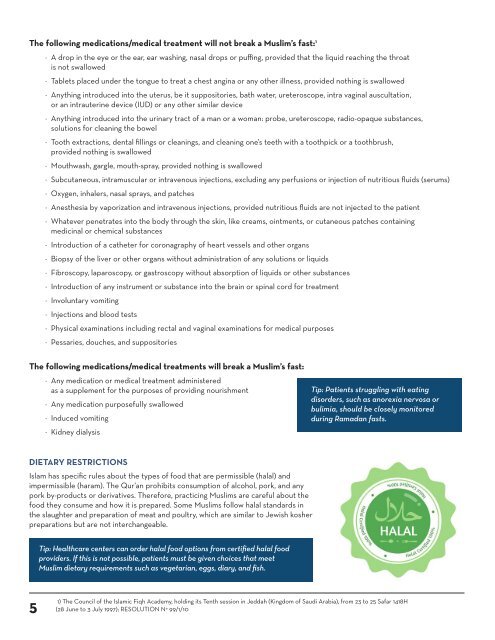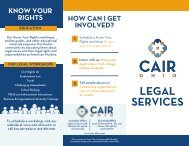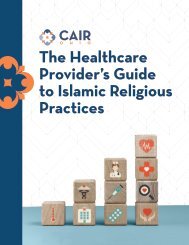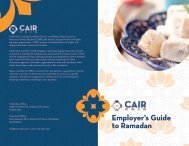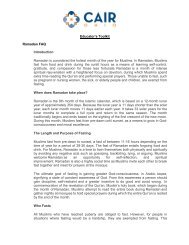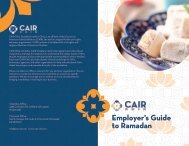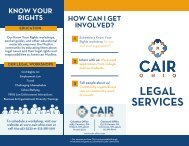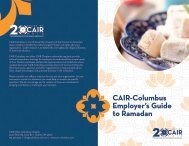CAIR-Ohio-Healthcare-Providers-Guide
Create successful ePaper yourself
Turn your PDF publications into a flip-book with our unique Google optimized e-Paper software.
The following medications/medical treatment will not break a Muslim’s fast: 1<br />
− A drop in the eye or the ear, ear washing, nasal drops or puffing, provided that the liquid reaching the throat<br />
is not swallowed<br />
− Tablets placed under the tongue to treat a chest angina or any other illness, provided nothing is swallowed<br />
− Anything introduced into the uterus, be it suppositories, bath water, ureteroscope, intra vaginal auscultation,<br />
or an intrauterine device (IUD) or any other similar device<br />
− Anything introduced into the urinary tract of a man or a woman: probe, ureteroscope, radio-opaque substances,<br />
solutions for cleaning the bowel<br />
− Tooth extractions, dental fillings or cleanings, and cleaning one’s teeth with a toothpick or a toothbrush,<br />
provided nothing is swallowed<br />
− Mouthwash, gargle, mouth-spray, provided nothing is swallowed<br />
− Subcutaneous, intramuscular or intravenous injections, excluding any perfusions or injection of nutritious fluids (serums)<br />
− Oxygen, inhalers, nasal sprays, and patches<br />
− Anesthesia by vaporization and intravenous injections, provided nutritious fluids are not injected to the patient<br />
− Whatever penetrates into the body through the skin, like creams, ointments, or cutaneous patches containing<br />
medicinal or chemical substances<br />
− Introduction of a catheter for coronagraphy of heart vessels and other organs<br />
− Biopsy of the liver or other organs without administration of any solutions or liquids<br />
− Fibroscopy, laparoscopy, or gastroscopy without absorption of liquids or other substances<br />
− Introduction of any instrument or substance into the brain or spinal cord for treatment<br />
− Involuntary vomiting<br />
− Injections and blood tests<br />
− Physical examinations including rectal and vaginal examinations for medical purposes<br />
− Pessaries, douches, and suppositories<br />
The following medications/medical treatments will break a Muslim’s fast:<br />
− Any medication or medical treatment administered<br />
as a supplement for the purposes of providing nourishment<br />
− Any medication purposefully swallowed<br />
− Induced vomiting<br />
− Kidney dialysis<br />
Tip: Patients struggling with eating<br />
disorders, such as anorexia nervosa or<br />
bulimia, should be closely monitored<br />
during Ramadan fasts.<br />
DIETARY RESTRICTIONS<br />
Islam has specific rules about the types of food that are permissible (halal) and<br />
impermissible (haram). The Qur’an prohibits consumption of alcohol, pork, and any<br />
pork by-products or derivatives. Therefore, practicing Muslims are careful about the<br />
food they consume and how it is prepared. Some Muslims follow halal standards in<br />
the slaughter and preparation of meat and poultry, which are similar to Jewish kosher<br />
preparations but are not interchangeable.<br />
Tip: <strong>Healthcare</strong> centers can order halal food options from certified halal food<br />
providers. If this is not possible, patients must be given choices that meet<br />
Muslim dietary requirements such as vegetarian, eggs, diary, and fish.<br />
5<br />
1) The Council of the Islamic Fiqh Academy, holding its Tenth session in Jeddah (Kingdom of Saudi Arabia), from 23 to 25 Safar 1418H<br />
(28 June to 3 July 1997); RESOLUTION N° 99/1/10


